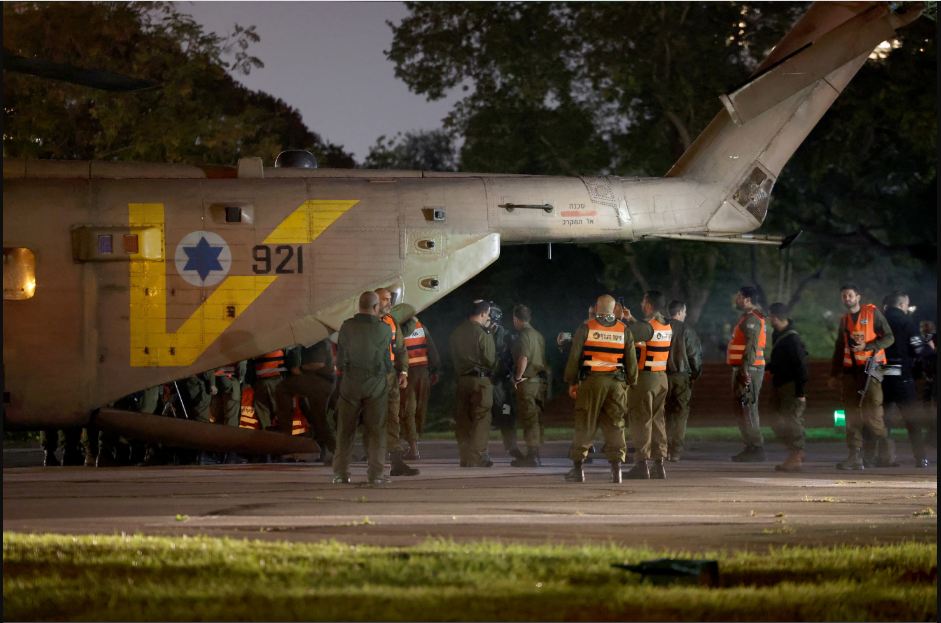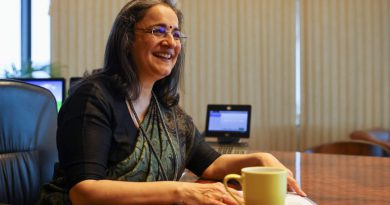Israel reviews list of hostages set to be freed by Hamas on Saturday
Gaza/Jerusalem (Reuters) – Israel has received a list of hostages to be freed from Gaza on Saturday by Palestinian militant group Hamas, officials said, following the release of 24 hostages the previous day, the first of a planned four-day truce.
Israeli security officials were reviewing the list, the office of Prime Minister Benjamin Netanyahu said in a statement, after his government’s vow to work for the release of all hostages taken by Hamas in an attack on Israel on Oct. 7.
The pause in the fighting was the first such break, with both sides saying hostilities would resume as soon as the truce ends. U.S. President Joe Biden expressed hope it could be extended, however.
The released hostages, including Israeli women and children and Thai farm workers, were transferred from Gaza and handed to Egyptian authorities at the Rafah border crossing, along with eight staff of the International Committee of the Red Cross in a four-car convoy, the organisation said.
They were then taken to Israel for medical checks and re-unions with relatives.
Qatar, which acted as mediator for the truce deal, said 13 Israelis had been released, some with dual nationality, as well as 10 Thais and a Philippine national – farm workers employed in southern Israel when they were seized.
Thirty-nine Palestinian women and children, some convicted or detained on suspicion of weapon charges and violent offences, were released from Israeli jails. The freed Israeli hostages included four children accompanied by four family members, and five elderly women.
Biden said there was a real chance of extending the truce, adding that the pause was a critical opportunity to get humanitarian aid into Gaza.
He declined to speculate how long the Israel-Hamas war would last. Asked at a press conference what his expectations were, he said Israel’s goal of eliminating Hamas was legitimate but difficult.
The Palestine Red Crescent Society said 196 trucks of humanitarian aid carried food, water and medical supplies through the Rafah crossing on Friday, the biggest such convoy into Gaza since Hamas’ assault on Israel and Israel’s subsequent bombardment of the territory.
About 1,759 trucks have entered the narrow enclave since Oct. 21, it added.
Aid groups have used the truce to evacuate patients and health workers from some northern hospitals that have all but collapsed due to attacks and lack of fuel.
The World Health Organization helped transfer 22 patients from Al Ahli hospital to the south on Friday, its chief Tedros Adhanom Ghebreyesus said on social media platform X.
“To meet all the health needs in Gaza, much more support is needed and above all sustained ceasefire,” he said.
Mixed Emotions In Israel
The families of hostages expressed mixed emotions, fearing for those left behind.
“I’m not dead, I’m not dead,” Thai farm worker Vetoon Phoome told his family, who thought he had been killed in the Hamas attack seven weeks ago, according to his sister, Roongarun Wichagern.
She told Reuters from her home in northeastern Thailand that her 33-year-old brother’s survival was a “miracle”.
Ten Thai labourers were among the hostages released. Thailand said 20 of its nationals remain captive, with Prime Minister Srettha Thavisin urging their release “as soon as possible” in a post on social media.
A source briefed on the negotiations said the Thai release was unrelated to the truce deal with Israel and followed a separate track of talks with Hamas mediated by Egypt and Qatar.
“I’m excited for the families who today are going to hug their loved ones,” Shelly Shem Tov, the mother of Omer Shem Tov, 21, said in an interview with Israel’s Channel 12, although he was not among those released on Friday.
“I am jealous. And I am sad. Mostly sad that Omer is still not coming home.”
Israeli tallies show Hamas fighters killed 1,200 people in the October attack and took about 240 hostages.
Since then, Israel has rained bombs on the Hamas-ruled enclave, killing about 14,000 Gazans, roughly 40% of them children, Palestinian health authorities say.
Hundreds of thousands of Gaza’s 2.3 million people have fled their homes, including most of those in its northern half.
The Palestinian Journalists Syndicate estimates as many as 66 media representatives were killed, including six women journalists, with two missing in Gaza since Oct. 7.
After initial medical checks, the released hostages were taken to be reunited with families. Medical authorities said they appeared to be in good physical condition.
Roni Haviv, a relative of Ohad Munder, said she looked forward to giving the nine-year-old his favourite toy.
“I’m waiting to see Ohad and can’t wait to give him his Rubik’s Cube, which I know he really loved and he probably missed it so much,” she added.
Those released on Friday were exchanged for 24 jailed Palestinian women and 15 teenagers, some of them convicted on weapon charges and violent offences.
In at least three cases, prior to the prisoners’ release, Israeli police raided their families’ homes in Jerusalem, witnesses said.
Police declined to comment.
“There is no real joy, even this little joy we feel as we wait,” said Sawsan Bkeer, the mother of 24-year-old Palestinian Marah Bkeer, jailed for eight years on knife and assault charges in 2015.
Israeli police were seen raiding her Jerusalem home before her daughter’s release.
“We are still afraid to feel happy,” she added.



